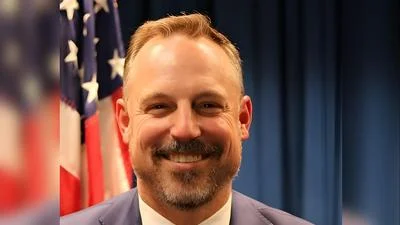Tim Walz | Tim Walz Official Website
Tim Walz | Tim Walz Official Website
[ST. PAUL, MN] – Governor Tim Walz on May 19, 2023, signed historic gun safety measures into law, including universal background checks and a red flag law that allows law enforcement to intervene when someone is at high risk of injuring themselves or others with a firearm. Governor Walz and Lieutenant Governor Peggy Flanagan were joined by former Congresswoman and gun violence prevention advocate Gabby Giffords, legislators, and gun safety advocates to celebrate the action taken to address gun violence.
“As a veteran, gun-owner, hunter, and dad, I know basic gun safety isn’t a threat to the Second Amendment – it’s about keeping our kids safe,” said Governor Walz. “There’s no place for weapons of war in our schools, churches, banks, or anywhere else people are just trying to live their lives. Today is about taking meaningful action to create a safer future for our kids, and I am proud to sign this commonsense, life-saving legislation into law.”
“As a mom, I am very clear that our first responsibility to our kids is keeping them safe. With this historic budget, we are going to do just that,” said Lieutenant Governor Flanagan. “By signing a red flag law and universal background checks into law, we are saving lives and building a better, more hopeful future for our kids. Thank you to Congresswoman Giffords and all of the advocates who turned their deepest pain into hope and progress – their courage is why we are here today.”
Historic gun safety and violent crime prevention measures in Chapter 52, Senate File 2909 include:
Universal Background Checks
The bill requires a background check for private party transfers of pistols and semiautomatic weapons. A background check is not required for a private transfer of a hunting rifle or between immediate family members. Both parties must retain a copy of the record of the transfer for 10 years.
Extreme Risk Protection Orders
Extreme risk protection orders, also known as “red flag laws,” allows a family member, guardian, city or county attorney, or police chief to intervene when someone is at high risk of injuring themselves or others with a firearm.
Bureau of Criminal Apprehension
The bill invests over $43 million over four years for the Bureau of Criminal Apprehension (BCA) to combat violent crime statewide. This investment will provide increased funding for BCA lab analysis, analytics supports, and to continue partnerships with local law enforcement.
Limiting No-Knock Warrants
The bill limits the use of no-knock warrants. These warrants can only be allowed if either the search cannot be executed while the premises is unoccupied or the occupants in the premises present an imminent threat of death or great bodily harm to the officers executing the warrant or other persons.
Other highlights of the public safety bill include:
- Providing funding to reimburse counties for the costs of sexual assault examination kits, to fill the gap in federal victims of crime act funding, and for the BCA to meet a 90-day goal for forensic evidence exam turnaround times.
- The bill establishes the Office of Missing and Murdered Black Women and Girls to promote the safety and success of Black women and girls through training, advocating for systems change, and ending violence against and trafficking Black women and girls.
- Investing $87.2 million to help ensure evidence-based practices, bring community supervision systems up-to date with needed funding across the three delivery systems, and provide state funding to tribal governments.
- $70 million for the Office of Justice Programs (OJP) to provide grants to community-based crime prevention programs. Eligible grantees include organizations that support victims of gun violence, youth support, violence interrupters, homelessness support, neighborhood watch, re-entry programs for incarcerated individuals, and community and faith-based projects.
- Providing $5 million in fiscal year 24 for the new Intensive Peace Officer Education & Training Program. Local law enforcement agencies will be able to receive grants so they can pay education and training costs, in addition to paying the candidate a salary while they are in training.
- $35 million over two years in juvenile-justice efforts. This includes funding for youth-intervention grants, dual status youth programs, restorative justice grants, increasing the capacity of OJP’s Youth Services Office, establishing a new office at OJP for Restorative Justice, and funding an innovative pilot program in Ramsey County for juvenile home placement and treatment.
- Ensuring incarcerated individuals have access to free phone calls for family and friends.
- Increased funding to the Department of Human Rights to strengthen their investigative capacity, legal team, settlement monitoring team, and equity and inclusion in state contracting work. These investments will support the Department’s vision to make Minnesota a state where everyone can lead lives fully of dignity and joy.
Original source can be found here.






 Alerts Sign-up
Alerts Sign-up